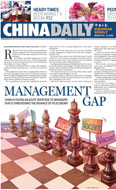Society
The great rush forward
Updated: 2011-03-13 07:57
(New York Times)
 |
Nurturing takes time, as do a lot of things that are good for us: slow, sustainable food; a gradual detox; a laid-back, more reflective way of life.
Yet speed seems to govern modern life, and many of us feel there are no chances to slow things down. "As cities get bigger, everything starts accelerating," Geoffrey West, a theoretical physicist, told the Times magazine. "There is no equivalent for this in nature. It would be like finding an elephant that's proportionally faster than a mouse."
If it's quicker, it's better, and every second counts. Google assumed that when it introduced Google Instant, which predicts Internet search queries and shows results as soon as someone begins to type. Google calculated that the tool would cumulatively save people more than 3.5 billion seconds every day.
And what could you do with those few extra seconds? Certainly not relax with a cup of coffee. Most coffee shops in America used to be places where one could sit for hours - most likely with a laptop - and while away the day for the price of a macchiato. But a growing number of bars like Café Grumpy and Stumptown Coffee Roasters in New York are doing away with comfortable seats, large tables and electrical outlets, and becoming more like their counterparts in Italy, where an espresso is treated as a quick refueling stop.
"It's not such a precious event," Matthew Schnepf, who often stands at the bar at Stumptown, told The Times.
And many of those people who were once hunched behind laptops are probably not blogging anymore, either. Blogs are losing their allure, especially for the younger generation, who prefer quick updates on Facebook and Twitter. New research showed that from 2006 to 2009, blogging among children ages 12 to 17 fell by half, and former bloggers said they were too busy to write lengthy posts.
In Asia, traders are too busy to take a break. Fast-growing markets in the region are upgrading with high-speed machines that can complete trades in 90 microseconds, and are vying to be the hub for international investors. Hong Kong said it would extend its trading hours and shorten its lunch break; Singapore is eliminating its midday hiatus.
"We're eating at our desk no matter what happens," Hani Shalabi, who oversees electronic stock trading for Credit Suisse clients in the Asia-Pacific region, told The Times.
Speed is what wins and not just for traders. South Korea claims the world's fastest Internet connections, but the government wants them to be even faster. By the end of next year, South Korea plans to connect every home in the country to the Internet at one gigabit per second. That would be a tenfold increase from the national standard, The Times reported.
"The name of the game is how fast you can get the content," Kiyung Nam, a spokesman for Samsung Electronics, told The Times. "People want to download and enjoy their content on the go."
Will we eventually hit a wall? Perhaps. But we'll adapt, and quickly. Mr. West knows that nothing can trend up forever. He says human history is defined by a constant tension between relentless growth and limited resources, which are exhausted more quickly as time wears on. What will save us? As Mr. West told the Times magazine, the only hope is constant - and more rapid - innovation: "It's like being on a treadmill that keeps on getting faster."
Anita Patil
E-paper

Rise and shine
The Chinese solar energy industry is heating up following recent setbacks in the nuclear sector
Bombs aim for regime change
CSI, with a twist
Literary path
Specials

Peony express
Growers of china's unofficial national flower are reaching out to europe for help

Tea-ing up
More turning to Chinese tea for investment opportunities like vintage wine

A cut above
The ancient city of Luoyang is home to a treasure trove of cultural wonders.
